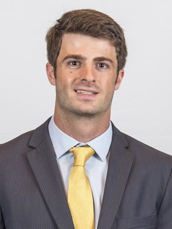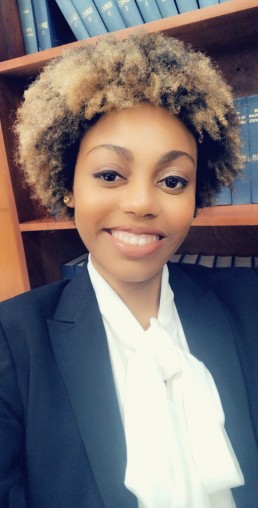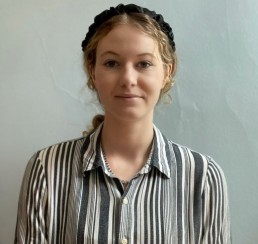Blog Post 2021 Summer Interns
Meet Our 2021 Summer Interns

Cole Baker is a rising 2L at the University of Maryland Francis King Carey School of Law. He is originally from Denver, Colorado. Cole graduated cum laude from the University of Delaware in the spring of 2020 where he played on the Division One men’s lacrosse team and double majored in Political Science and Economics. There, Cole was the chair of the men’s lacrosse team’s “Academic Weapons Committee,” an academic tutor for Political Science, Economics, and Science courses, and was a member of the Horn Center for Entrepreneurship. At Carey Law, Cole is a member of the National Trial Team which participates in mock trial competitions throughout the nation.

Erin Williamson is a rising third-year law student at The George Washington University Law School where she is concentrating her studies in intellectual property. Her interest in intellectual property began during her time as an undergraduate at Drexel University studying Music Industry Business. Erin aspires to pursue a career in copyrights and trademarks to advocate for the rights of creators. When she is not busy studying, she enjoys weightlifting and discovering new music for her ever growing Spotify library.

Delaney Halvey is a rising second semester 3L at Georgetown University Law Center (graduating in December 2021.) Delaney grew up in Tucson, Arizona, where she enjoyed hiking, camping, trail running, and mountain biking. In 2018, Delaney graduated from Texas A&M University with a degree in industrial engineering and minors in cybersecurity and math. As a college student, she knew she wanted to attend law school and was able to shadow several members of Raytheon’s legal department when she worked there as an engineering intern. As a law student, Delaney has worked in D.C.’s Landlord Tenant Resource Center, as a Research Assistant and Teaching Assistant at Georgetown, as an intern for the U.S. Office of Personnel Management Inspector General, and in her personal favorite job as a tennis coach at Brentwood Elementary. Delaney am excited for the opportunity to now be working for IIPSJ, and is looking forward to everything she will learn this summer.

Sara Griffiths was born and raised in Kingston, Jamaica. After relocating to the United States for high school she went on to graduate magna cum laude from Miami-Dade College and thereafter transferred to American University and completed her education at the School of International Service. While there she earned a bachelor’s degree in International Studies with concentrations in Identity, Race, Gender and Culture and Peace, Global Security and Conflict Resolution with a regional focus in Latin America and the Caribbean. She is presently a law student at Georgetown University Law Center where she participates in both the Global Law Scholars and Human Rights Associates Program. She has interned at the Jamaican Court of Appeal, the 39th regional Caribbean Community (CARICOM) Heads of State Conference, and the Embassy of Jamaica at Mexico. She has particular interests in international human rights and public international law and intersectional and critical race theory and is fluent in English as well as Patois—the Jamaican Creole dialect.
Blog Post TPAC/PPAC Nominations
USPTO Seeking Nominations for Vacancies on the TPAC and PPAC
by Delaney Halvey
The U.S. Patent and Trademark Office (USPTO) is seeking nominations to fill upcoming vacancies on the Trademark Public Advisory Committee (TPAC) and Patent Public Advisory Committee (PPAC.)[1] TPAC and PPAC committee members are responsible for representing the diverse interests of the users of the USPTO with respect to trademarks and patents. Some of their recent work included in the TPAC and PPAC 2020 Annual Reports includes: a TPAC commendation of Trademark Operations during the COVID-19 pandemic, including modernization of IT products and adaption to teleworking; formation of a PPAC AI Subcommittee to provide guidance to USPTO leadership; TPAC review of the TTAB expedited cancellation pilot program aimed at “decluttering” the Trademark Register; and PPAC oversight of a Congress-driven effort to diversify inventorship.[2]
As these projects highlight, the members of these committees have an important and influential role in USPTO operations. They keep the USPTO accountable to their goals, both self-generated and passed down from Congress, while also providing input into future goals. Because there are several degrees of separation between the operations of the USPTO and the votes of stakeholders, the committees remind USPTO leadership of these stakeholders’ interests. Examples of this middleman role include public meetings, which provide a public forum for interested parties to air their opinions, and fee setting hearings, which allow for stakeholder testimony.
For the committees to be effective representatives of the community who uses the USPTO system, it is vital that their membership reflect the diversity of this community. Federal law requires each member to have a “substantial background and achievement in finance, management, labor relations, science, technology, and office automation,”[3] and provides only that small and large entity applicants must be represented.[4] Perhaps as is to be expected, the committees have been historically biased in memberships towards representatives of large entity applicants. Aside from the size of the entity applicant, other diversities the committee membership would benefit from reflecting include: the racial and cultural background of applicants, the industry of applicants, the gender identity of applicants, and the geographic location of applicants.
Nominations must be submitted electronically by completing the corresponding Public Advisory Committee application: https://tinyurl.com/ynae4a67 for the Patent Public Advisory Committee, or https://tinyurl.com/hcux6462 for the Trademark Public Advisory Committee. These applications ask for detailed contact information for both the nominating and nominated party, as well as information regarding publications, awards, credentials, and details about the organization represented by the nominated party. Nominations will be accepted on or before July 9, 2021.
[1] https://www.uspto.gov/about-us/news-updates/uspto-seeks-nominations-patent-and-trademark-public-advisory-committees
[2] https://www.uspto.gov/sites/default/files/documents/TPAC_2020_Annual_Report.pdf & https://uspto.gov/sites/default/files/documents/PPAC_2020_Annual_Report.pdf
[3] 35 U.S.C. 5(b)(3)
[4] https://www.federalregister.gov/documents/2021/05/25/2021-11047/patent-and-trademark-public-advisory-committees

Delaney Halvey is a summer intern with IIPSJ. She is a rising second semester 3L at Georgetown University Law Center (graduating in December 2021.)
Blog Post Status Update on Student Athlete NIL Legislation
Status Update on Student Athlete NIL Legislation
by Cole Baker
Name, image, and likeness (NIL) legislation takes effect in 7 states throughout July. These states (Alabama, Arizona, Florida, Georgia, Mississippi, Nebraska, and New Mexico) are part of a nationwide push by state legislatures to enact laws that allow for collegiate student-athletes to profit off their NIL. 39 states have introduced bills to their legislatures, and 16 states have officially signed NIL legislation into law.
How We Got Here
In September 2019, Gov. Gavin Newsome (CA) signed into law California’s Fair Pay to Play Act making it unlawful for universities to revoke a student-athlete’s scholarship for receiving compensation from use of his or her NIL in a commercial nature.¹ After numerous states followed suit by enacting similar legislation, the NCAA Board of Governors released a statement indicating that it would look to “modernize” its rules and add “flexibility” to its policy of banning any monetization of NIL by participating student-athletes.² After months of deliberation and direction to each subdivision of competition to discuss changes to its policy, the NCAA released another statement in April 2020 indicating that it is supportive of allowing athletes to sign endorsement contracts and appear in advertisements.³ The NCAA received draft legislation from each of its 3 subdivisions for updates to NIL policy in November of 2020.4
The NCAA has repeatedly called on Congress to enact federal legislation to both standardize NIL policy on a national scale and carve out an antitrust exemption for the NCAA to allow caps on NIL compensation earned by its athletes.5 So far there have been 8 bills introduced to Congress dealing with the issue. The Senate Committee on Commerce, Science, and Transportation held a hearing on June 9th to receive testimony on the issue of NIL for collegiate athletes, how a national policy would benefit consistency and fairness of its implementation both for institutions and athletes, and the competing interests at state between the NCAA, its member-institutions, and athletes. Senators Booker and Blumenthal stressed the importance of health-care related legislation being included in the prospective bill and championed their Athlete Bill of Rights. Mark Few, head coach of the Gonzaga men’s basketball team testified indicating it is embarrassing that nothing has been done thus far with respect to creating avenues for athletes to exploit their NIL rights. Mark Emmert, president of the NCAA, also testified urging the Senate Committee to consider five policy matters included in any NIL bill: (1) the bill put in place a unified national NIL model, (2) the bill support Title IX considerations, (3) the national policy expressly preempts state NIL law, (4) the bill safeguard the non-employee status of student athletes, and (5) the bill create legal exemptions for the NCAA and its member-institutions to antitrust concerns. Emmert received push back on the latter two recommendations from testifying witnesses and senators alike. Senator Cantwell, chair of the committee, concluded the hearing by indicating that due to the fact that more than half of the senate-committee members testified, the Commerce Committee is committed to get something done in regards to national NIL policy.
The NCAA has also received federal attention from the Department of Justice’s antitrust division, which undertook meetings and corresponded with NCAA officials regarding the policy reforms.6 The DOJ has expressed it’s wariness of the NCAA policies as violating antitrust laws. It has specifically taken issue with the antitrust concerns arising out of the NCAA’s purported 3rd-party “clearinghouse” agency proposal. The policy proposal indicates athletes would be forced to disclose NIL earnings to ensure compliance with a capped sum. The sum would be dictated by the NCAA’s determination of what represents a “fair-market value” for NIL.7 Furthermore, the Supreme Court heard oral arguments in Alston v. NCAA. While not dealing directly with NIL, it is an antitrust suit which may answer the question of whether the NCAA model is truly one of amateurism in a decision likely to be released this month.8 To learn more about the case, NPR recently looked into it in their Planet Money podcast.
A Summer of Change
So far, 39 states have introduced bills relating to student-athlete NIL compensation within their legislatures, and 16 of those states have signed these policies into law.9 The NCAA Division 1 council is expected to act on proposed policies on June 23, 2021.10 On July 1, 2021, NIL laws take effect in Alabama, Florida, Georgia, Mississippi, Nebraska (pending individual school adoption) and New Mexico; Arizona’s laws will take effect on July 23.
These state laws differ in scope. Some are less restrictive than the proposed NCAA policies, whereas others are more restrictive. For example, Mississippi’s law permits schools to prohibit athletes from wearing any clothes with a sponsoring-entity’s logo or insignia at any school-sponsored event, whereas the NCAA policy would regulate the appearance of athlete sponsors’ logos only during pre- and post-game activities.11 Furthermore, Mississippi prohibits athletes from receiving NIL compensation prior to enrollment in their first college class, whereas the current NCAA policy would allow for high school students to seek NIL compensation as early as their 9th grade year.12 On the other hand, New Mexico has some of the most lenient rules pertaining to NIL compensation. The state prohibits schools from terminating an athlete’s eligibility to participate or receive scholarships regarding any “food, shelter, medical expenses or insurance from a third party.” The state further prohibits schools from interfering with a student-athlete’s choice of footwear during any mandatory team activity.13
There are many questions left unanswered without a national policy in place from the NCAA or Congress. Will athlete’s still be subject to exploitation of their schools when most of the state laws leave determining acceptable commercial conduct up to the school’s own internal policy? How will school’s handle licensing issues where athletes appear in advertisements or promotions with their logos and insignia? Will athlete’s have their NIL earnings be capped or confined to monetary compensation, and is that even lawful under antitrust laws? Nevertheless, athletes in these seven states may be able to sign endorsement deals in July so long as they are compliant with state law. However, it is expected that the NCAA will file suit against these states if they do not come up with a national policy plan beforehand.14 Regardless, this summer marks the start of a new era of collegiate athletics which will undoubtedly change the landscape of sport for athletes who have for decades had their talents and work exploited by the NCAA model.
¹ CAL. EDUC. CODE §§ 67456-57 (2019).
² Board of Governors starts process to enhance name, image and likeness opportunities, NCAA (October 29, 2019).
³ Dan Murphy, NCAA group supports player endorsement plan, ESPN (April 29, 2020).
4 Taking Action–Name, Image, and Likeness, NCAA (2021).
5 Murphy, supra note 3.
6 Steve Berkowitz et. al., DOJ critical of NCAA’s view of antitrust compliance; association president Mark Emmert wants voting delay on rules proposals, USA Today (January 9, 2021).
7 Id.
8 Dan Murphy, Everything you need to know about the NCAA’s NIL debate, ESPN (May 24, 2021).
9 Tracker: Name, Image and Likeness Legislation by State, Business of College Sports (June 2, 2021).
10 Murphy, supra note 8.
11 Steve Berkowitz, Name, image and likeness laws vary by state. A closer look at those going into effect July 1., USA Today (May 28, 2021).
12 Id.
13 Id.
14 Murphy, supra note 8.

Cole Baker is a summer intern with IIPSJ. He is a rising 2L at the University of Maryland Francis King Carey School of Law.
For more on this topic, check out these posts:
Video: Right of Publicity Update
NCAA’s Proposed NIL Regulations Are an Antitrust Violation Waiting to Happen
Recent Name/Image/Likeness Legislation Will Change the NCAA (or Not)
The California Fair Pay to Play Act- Finally IP Social Justice for Student Athletes
